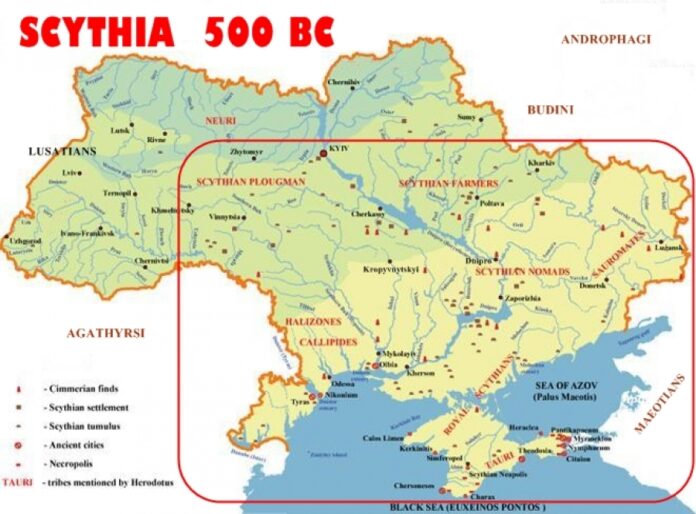Oleksandr Palii, A History of Ukraine, 27.12.2017
By the 6th century BC, Persia (now Iran) became the most powerful state in the ancient world, having conquered Lydia, Syria, Palestine, Egypt and part of India. Persia became the first superpower of the world simultaneously on three continents — Asia, Europe and Africa.
The army of the Persian Emperor Darius I invaded Scythia in 513 BC. Herodotus wrote about 700,000 Persian soldiers, not counting ship crews, and 600 ships. Bridges were built over the Bosporus Strait and the Lower Danube for the Persians.
In response to a demand of surrender, the Scythians sent a bird, a frog, a mouse and five arrows to the Persian king. This signified, according to the historian, “Unless you take to the air, like a bird; to the earth, like a mouse; or to the water, like a frog, you will become the victim of the Scythian arrows.”

Gold plate, 4th century BC, with an image of a Scythian wearing sharovary (wide trousers). Sharovary are a part of the traditional Ukrainian costume
The Scythians initially retreated before the Persian army, driving away their cattle, filling wells with earth and burning the steppe. In southern Ukraine, there are still place names associated with Darius I and his campaign — Darievy Mist (Bridge of Darius) and Darievy Brid (Ford of Darius). The Persians advanced all the way to the Don River. However, overwhelmed by the victorious heroism of the Scythians, the Persian king fled during a decisive battle, leaving the wounded behind.
It turned out that the world’s biggest superpower could not wage war against Scythia with impunity. Pursuing the enemy, the Scythian army reached the Bosporus and the Dardanelles. The Scythians made a pact against Persians with Sparta, the most powerful Greek state at the time. According to Herodotus, the Spartan king became drunk during negotiations with the Scythians, because he drank, together with envoys, pure wine, while the Greek custom was to dilute wine with water. Since then, the Greeks said “pour in the Scythian style” when they drank undiluted wine.

Gold hair comb from the Solokha Scythian burial mound (southern Ukraine) depicting a battle of the Scythians, 4th century BC, 294 grams, kept in the Russian Hermitage
In 334 BC, the Macedonian king Alexander the Great started his military campaign, advancing to the east. He defeated the huge army of the Persian Empire, taking the Persian royal family captive, subjugated Asia Minor, Phoenicia, Palestine, Syria and Egypt, and was preparing to go to India.
Alexander ordered Zopyrion, his governor in Thrace (the territory of modern Bulgaria), to go and help along the northern coast of the Black Sea. The Macedonians planned to conquer the Scythians and the Greek city of Olbia (now in Mykolaiv Oblast). Zopyrion’s 30,000-strong army besieged the city but was unable to take it, with the Scythians in the rear. As the Macedonian army retreated, it was defeated by the Scythians near the Dniester estuary. At the time, it was the only defeat of the invincible Macedonia.

Scythian coin of King Ateas, 4th century BC
For centuries after this event, enemies preferred not to touch Scythia. In the 4th century BC, the Greek historian Thucydides called the Scythians “the strongest not only in Europe but also in Asia”.
The Scythian state survived until the 4th century AD. Later, the Scythians dissolved among related peoples, the Sarmatians and the Slavs.
States that later emerged in the territory of Ukraine — the Hun Empire and Kyivan Rus’ — considered themselves to be successors of Great Scythia.






















